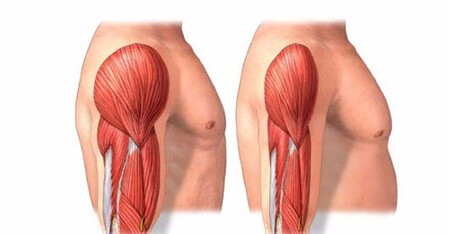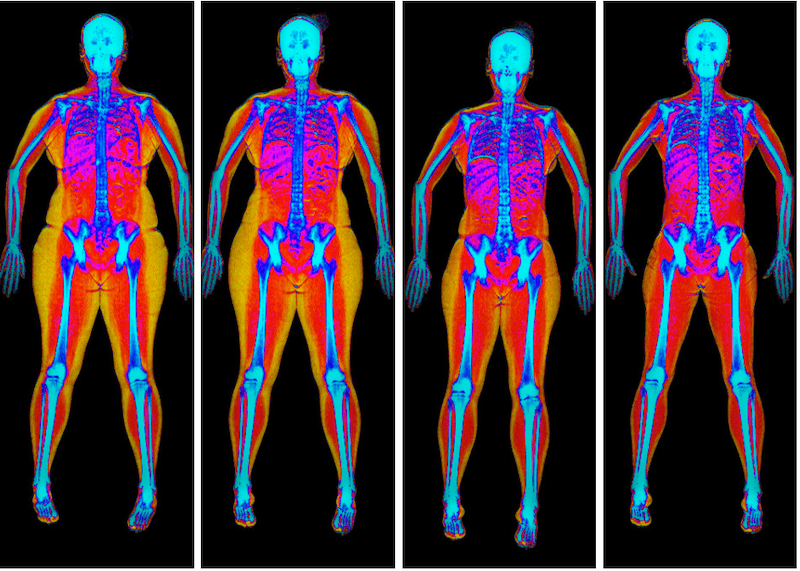
BLOG
How long will it take to regain lost muscle (eg, during lockdown)?

How quickly can I regain muscle (and how quickly will I lose muscle)?
During the pandemic in 2020/21, the gyms were closed and so most of us stopped weight-training completely. Since then, two questions we’ve been asked many times are “How quickly will I lose muscle?” and “How hard will it be to regain lost muscle?”
Whether dictated by a lockdown diktat or whether you just get demotivated and stop going to the gym, let’s start with muscle loss. Your rate at which you lose muscle will depend mainly on two things:
1. How much muscle you had gained above your natural set point (the amount you have without weight training)
2. How much weight training you did to build that amount of muscle
Muscle loss is predictable based on muscle gained
First of all, we all have a natural ‘set point’ when it comes to muscle mass – as we’ll explain during your first DEXA consultation, we all sit naturally somewhere on the spectrum of muscularity. Some people are naturally slim, skinny, petite, whilst others are naturally much more solid, heavy and muscly. A DEXA scan (see below) is a good way to establish what your set point is.
If you’ve been resistance training, you will (hopefully) have gained muscle mass, but this higher level of muscle is artificially high – you have taken your body to a more muscular state by stimulating it with heavy-weight exercises and fuelling it with more energy in the form of calories and protein.
Muscle is calorie-hungry (as are your internal organs, which perform a more essential function than muscles – keeping you alive). This means that, once you stop applying the stimulus and fuel to grow muscle, your body will seek to ditch this high-octane energy-burner and divert resources to more important processes.
Therefore, the more muscle mass you have gained above that natural ‘set point’, the more muscle mass you will likely lose when you stop training (equating to a faster rate of muscle-loss). If you’ve gained 2-3kg of muscle mass over the course of six months of training, you could well maintain most of this. If you’ve been training for many years and have gained 12-15kg of muscle, you’re going to see a much bigger proportion (and therefore a bigger absolute amount) of lost muscle.

Will muscle loss be affected by training frequency?
Also, the more frequently and intensively you were weight training before lockdown, the faster you will lose the muscle mass you gained. For example, if your level of muscle is where it is because you normally (had to) train six times per week, expect a faster rate of muscle loss than if you were only training twice a week.
That’s because the volume and intensity of a six-day muscle-building schedule will have been cut by a much bigger factor than the two-day regime. In other words, the more dramatic the reduction in your training regime, the faster your muscle mass will decrease.
Using DEXA to discover your natural amount of muscle mass (your ‘set point’).
If you have never done any resistance training and are about to start, a DEXA body scan is an excellent way of finding out your natural ‘set point’. The DEXA scan will precisely measure three ‘compartments’ of your body composition – fat mass, lean mass (essentially muscle mass) and bone mass. We say ‘essentially’ muscle mass because your lean mass is more than just your muscles and includes your organs and all fat-free soft tissue. That said, it is an excellent proxy for your muscle because typically about half of your lean mass is, in fact, skeletal muscle.
Whilst the total amount of muscle mass you carry might seem enough to gauge your set point, it’s not. Because – think about it – tall people will typically have more muscle mass (and fat and bone mass) than shorter people. To that end, the DEXA scan report takes this into account and provides a critical (and comparable) indicator of your overall muscle mass, known as your Lean Mass Index, or LMI. This is essentially how much muscle you carry in relation to your height.
At your DEXA scan appointment, your consultant will plot all your results against our database of more than 17,000 others to give you a meaningful and contextual snapshot of your natural muscle mass. Below are the male and female LMI tables. You can see in the top table that for a man in his thirties, an LMI of 19.1 describes average muscle mass (the 50th percentile). In the lower table, a 27-year-old woman with an LMI of 16.9 puts her in the 80th percentile of lean-for-height, a level typically found in an amateur bodybuilder.


If you do not do weight training but regularly practise a sport, such as football, rugby or running, then your natural amount of muscle mass will be affected by that sport and may be higher or lower than if you stopped or switched to another sport. Read this post for the difference between endurance and strength-based sports and the rep ranges required by each.

How quickly can I regain lost muscle?
When it comes to reversing muscle-loss post-lockdown or after any period of inactivity, you’ll be pleased to know that research suggests that “muscle memory” is real.
The nucleus (known as a myonucleus) of muscle cells is responsible for rebuilding new proteins. Over time, with effective resistance training, each muscle cells aquires more myonuclei. This allows them to produce more proteins, making the muscles bigger and stronger.
If you stop training, your muscle mass can shrink but the increased number of myonuclei remains. This means the ‘machinery’ needed to build the higher amount of muscle mass you had will still be there, even after long periods of inactivity and muscle loss. That’s the essence of ‘muscle memory’ and why those who have lost lean mass find it fairly easy to regain muscle.
It’s hard to quantify what muscle memory means because everyone is different but it could halve the time needed to regain lost muscle. In other words, a 12-week break from muscle-building might see muscle lost regained in just six weeks.
The best way to reverse muscle-loss is to make sure your weights programme is optimised – remember, whether you’re looking to gain muscle from scratch or regain muscle lost, as we explain in the video extract below, muscle-gain is all about the quality of your programme (as opposed to fat-loss being all about the calories).
Although lost muscle mass can be regained, we’d advise you to do as much resistance training as you can when you can’t get to a gym. This will slow the rate of muscle loss whether your long-term goal is muscle gain OR fat loss. All exercise is good for our physical and mental health during and, if you weren’t aware, strength training helps to maintain and increase bone density.
A DEXA scan will track muscle-loss (and muscle-gain)
A DEXA scan, as we’ve said above, is a very consistent tracker of fat and lean mass. To understand how much muscle you lost (and how much body fat you gained) during a period of inactivity, you will need to have a DEXA scan at those crucial turning points – when you stopped weight-training and when you restarted. It’s best for any measurements (tape measure, DEXA scan, one-rep-max, etc) to ‘book-end’ a period of consistency, whether that be consistently zero exercise or consistently four times a week and prepped food. We’ll then be 100% certain that changes in body composition are due exclusively to everything that happened (or didn’t happen) in that period, and nothing else.
The Progress scan reports will show you the precise changes in total fat and lean mass between each scan. Regular DEXA scans regularly produce the best results because they keep you accountable and enable you to change what you’re doing if your regime is not having the desired results. Why continue an arduous weights programme for eight months if a DEXA scan can show you after four months that it’s not working for you?!

If you want to know how much a DEXA scan costs in the UK, take a look at our UK DEXA scan prices and book your first Baseline DEXA appointment now.


